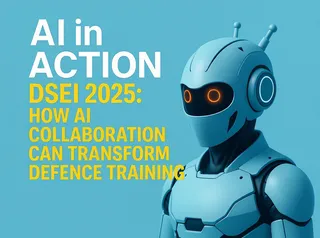AI Transforms Aviation Training
Contact Our Team
For more information about how Halldale can add value to your marketing and promotional campaigns or to discuss event exhibitor and sponsorship opportunities, contact our team to find out more
The Americas -
holly.foster@halldale.com
Rest of World -
jeremy@halldale.com

Key Takeaways
- AI can analyze instructor performance with 90-95% accuracy in identifying observable behaviors, significantly outperforming human examiners.
- Simple mobile phone recording combined with AI processing can provide comprehensive training evaluations.
- Every training session becomes a mentoring opportunity for instructors through immediate AI-generated feedback.
- The system supports Evidence-Based Training (EBT) and Competency-Based Training and Assessment (CBTA) frameworks.
- AI provides "brutally honest" assessments that are more factual than traditional human evaluations.
- Implementation requires comprehensive training for instructors, pilots, management, and regulators.
At the Asia Pacific Aviation Training Summit (APATS) 2025 in Singapore, Cedric Paillard, CEO of The Airline Pilot Club, unveiled an AI-driven system that is revolutionizing flight instructor evaluation and training quality assurance. His presentation revealed a sophisticated AI solution that transforms every training session into a data-driven learning opportunity.
The Challenge: Evaluating Training Records
This work emerged from extensive collaboration with operators (airlines and flight training schools), where training programs and instructor capabilities are regularly evaluated. "When we come to large amounts of recruitment, we are often asked to look at the training records of those pilots," Paillard explained. "We found ourselves in situations where the training records are basically a lot of threes and a lot of fours with very few explanation to guide us."
This lack of detailed feedback created significant challenges for training departments when selecting type rating instructors, examiners, or promoting first officers to captain positions. The aviation industry's push toward Evidence-Based Training (EBT) and Competency-Based Training and Assessment (CBTA) frameworks has intensified the need for comprehensive data analysis.
AI as the Solution: The iORCA System
The team developed iORCA (Instructor Observe, Record, Classify, Assess), a derivative of their existing ORCA system. The solution addresses a critical gap in aviation training: instructor performance evaluation and development.
"The reality is that we depend, crucially depend on the instructor, and those instructors are the core of how an EBT and CBTA program works," Paillard noted. "The idea of providing the instructor with the support for them to become better, for them to understand where they can become better, and for the management to look at how to calibrate the instructor became crucial."
Revolutionary Simplicity: Phone Recording Meets AI
The system's elegance lies in its simplicity. Training sessions can be captured using basic audio and video recording—often with just a mobile phone. The AI then processes this raw data natively, without requiring transcription for analysis.
"Audio, video, plug your phone and start recording that information. And really, that's all we wanted actually to do. Initially, very simple, nothing fancy, very clean," Paillard described.
The AI evaluates 4 competencies across roughly the 40 instructor observable behaviours, using the familiar IATA framework for grading instructor performance.
Impressive Accuracy Results
Validation compared AI performance against human evaluators across three scenarios:
- Live examiners during training events
- Observers reviewing training sessions with 30-45 minutes for analysis
- iORCA AI system analysis
The results were striking. "The examiner picks up about 40-60% of the observable behaviors independently during the training event. When you step out a little bit and have time to review, the observer picks up a little bit more, and then iORCA, which is the AI, picks up all those observable behaviors to a point from around 90-95% depending on the set of data."
Brutally Honest Assessment
One of the system's most significant characteristics is its objectivity. "iORCA is brutally honest on observable behaviors," Paillard emphasized. "I know, as an instructor, I was often saying, 'Oh yeah, buddy tried hard, therefore I'm going to put a three.' iORCA will put a two and will have no problem putting a two but will also justify why you're putting a two."
This factual approach typically yields slightly lower grades compared to human evaluators, but it provides comprehensive justification for each assessment through detailed transcripts and evidence.
Every Session: A Mentoring Opportunity
The system changes the traditional training approach by turning every session into a growth opportunity. "Every training session is for the instructor an opportunity to be mentored because he gets the information right away. He knows what is missing. He knows what he's getting," Paillard explained.
For management, this represents a fundamental shift from periodic audits/observations to continuous monitoring. Organizations can segment data by pilot type, training phase, or specific programs, allowing focused attention on particular challenges rather than broad-brush assessments.
Implementation Considerations and Limitations
Paillard stressed the importance of comprehensive preparation before implementing AI-driven training evaluation. "You have to train your instructors, you have to train your pilots, you have to train your management, you have to train your regulator, because if you don't, those results could be significantly different."
The technology's role is clear: it's a support tool, not a replacement. "Nobody is losing their job using AI. Nobody is going to replace an instructor. Nobody is replacing an examiner. Nobody is replacing the head of training. The point is to provide a tool that allows the organization to do better, faster, more qualified using the evidence-based training framework."
Privacy and Data Management
The system maintains appropriate privacy boundaries. Individual instructor evaluation reports remain confidential to the instructor, while management receives de-identified aggregate data for organizational insights and calibration purposes.
Current Deployment
As of the APATS 2025 presentation, the system was being rolled out across multiple airlines and flight schools throughout Europe, marking a significant milestone in AI-assisted aviation training evaluation.
Looking Forward
This innovation represents a paradigm shift in aviation training quality assurance, offering unprecedented insight into instructor performance while supporting continuous professional development. By combining simple recording technology with sophisticated AI analysis, the aviation industry can achieve more consistent, evidence-based training outcomes while supporting instructor growth and organizational excellence.
The implications extend beyond individual performance evaluation to encompass systematic training program improvement, regulatory compliance enhancement, and ultimately, aviation safety advancement through more effective instruction and assessment practices.
Want to explore Paillard’s research further? Join his new workshop this November at EATS, AI in Aviation Training: From Hype to Hands-On.


